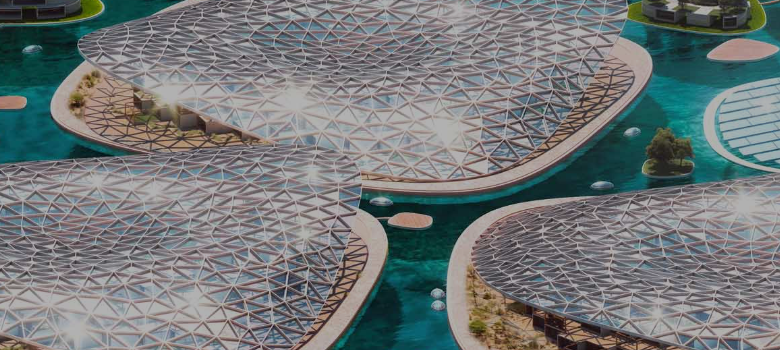
Dubai Reef, XZERO City and ALNAMA Smart City top the list of sustainable developments projects in the region
Transitioning to sustainable development in MENA progresses in leaps and bounds as three of the most promising sustainable development projects rapidly move towards completion.
Dubai Reefs, Dubai
Dubai Reefs is an ambitious project that aims to create a sustainable floating community dedicated to marine research, regeneration, and ecotourism. The project encompasses various facilities including residential, hospitality, retail, educational, and research centres. At the heart of the community is the marine institute, which will focus on enhancing the protection of Dubai’s marine and coastal environment. The institute aims to advance marine science and conservation in Dubai and contribute to the creation of the most diverse artificial reef spanning 200 square kilometres.
One of the primary goals of Dubai Reefs is to provide a habitat for over 1 billion corals and more than 100 million mangrove trees. By establishing such a diverse ecosystem, the project seeks to support the regeneration and conservation of marine life in the region.
The community will offer unique marine ecotourism experiences, featuring floating eco-lodges. These lodges will be powered by 100% renewable energy, utilising various forms of solar and hydro-power. Additionally, wave farms will be implemented to generate clean energy, catering to Dubai’s growing population.
Regenerative Ocean Farming is another prominent feature of Dubai Reefs. This climate-friendly food production technique will be employed to promote sustainable and environmentally responsible agriculture practices.
The ultimate vision of Dubai Reefs is to foster social, environmental, and economic benefits. By transforming Dubai into an eco-destination, the project aims to create a harmonious balance between the ocean and the city, where both can thrive sustainably.
XZERO City, Kuwait
XZERO is a visionary development planned for the southern region of Kuwait, spanning 1,600 hectares. The primary objective of the project is to provide 30,000 residential units and create 30,000 green jobs across various sectors such as medical, tourism, technology, education, retail, and entertainment.
Sustainable tourism will be promoted through a range of eco-friendly hospitality assets, including a 5-star eco resort and eco lodges. Edutainment attractions like the utility park and nature conservation centre will make the city a unique visitor destination. The green-tech hub will foster a collaborative and innovative environment for advancements in food, energy, water, and waste technologies. The medical hub will feature specialised facilities such as an autism village, wellness centre, and clinics. The educational hub will house a nursery, school, and institute, providing comprehensive learning opportunities. Additionally, the commercial hub will offer an indoor mall and flexible office spaces.
The master plan of XZERO incorporates passive design strategies and green/blue infrastructure to create a sustainable development that requires minimal financial investment while maximising environmental benefits. The city incorporates active strategies and state-of-the-art technologies to establish a smart city grid, ensuring the highest standards of living. The sustainability elements within the city are integrated into the landscape, serving as educational tools.
XZERO is designed with multi functional holistic solutions that address the three key pillars of sustainability: social, economic, and environmental. The city is optimised to be the most walk-able city on Earth, featuring well-shaded primary and secondary walking networks connected to green modes of transport such as cycling and electric buggies. This transportation network provides residents with safe, convenient, and enjoyable travel options throughout the city. Dedicated running and cycling tracks covering 35 km, as well as a 9 km equestrian track connecting to the equestrian centre, cater to the active lifestyle of the community.
The city’s density is optimised to maximise green space ratio, mitigating the effects of rising temperatures and urban heat islands, thus creating a cooler environment. Mixed-use areas are strategically located in the heart of the project alongside the highest density of residential units, reducing walking distances for most residents.
Ultimately, XZERO aims to provide the highest quality of life for its residents while preserving the environment for future generations. It sets a new benchmark for future cities to be planned in harmony with nature, promoting a greener circular economy.
ALNAMA Smart City Dubai
Riyadh’s smart city, named ALNAMA, is a visionary development aimed at providing 11,000 residential units for a population of 44,000 people. Spanning 1,000 hectares, the project is driven by URB and focuses on achieving the highest standards of social, environmental, and economic sustainability.
Passive design techniques such as orientation, density, and form have been utilised in the master plan to achieve the greatest environmental gains with minimal financial investment. ALNAMA will incorporate state-of-the-art technology and active strategies to offer residents the highest standards of living through its smart city grid.
The city will feature various hubs that transform it into a unique destination, attracting both ecotourists and medical tourists. The green-tech hub will foster an innovative ecosystem for urban-tech companies involved in food, energy, water, waste, mobility, and building materials.
The landscape design incorporates a variety of spaces and activities to promote social interaction, biodiversity, and a cooler environment. The master plan optimises density to maximise green space while creating a liveable and car-free city.
ALNAMA will become an edutainment attraction by integrating sustainability elements into its design, offering residents a sustainable lifestyle experience. The utility park, adjacent to the educational hub, serves as an educational tool for children and features state-of-the-art technologies addressing the food-energy-water nexus.
The hospitality hub of ALNAMA will include eco-friendly glamping lodges, eco resorts, and a nature conservation centre, promoting ecotourism. The medical hub will feature an autism village, wellness centre, and clinics, emphasizing medical tourism. Ultimately, ALNAMA aims to be a thriving work, live, and visit destination, ensuring a balance between people, the planet, and profit. It will serve as a benchmark for future cities, promoting greener economies centred around food, water, energy, and waste.



